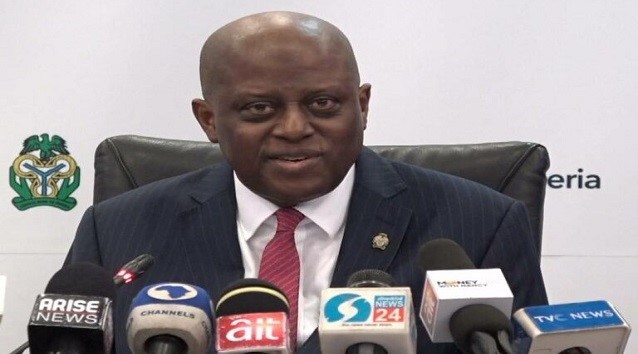E-Financial
Stakeholders, Global Leaders Commit to Bold Solutions for Africa @ ASIS 3.0

Africa Social Impact Summit (ASIS) 2024, co-convened by The Sterling One Foundation and the United Nations, was held at the Eko Convention Center from July 25-26. This landmark event highlighted the importance of collaboration across sectors, bringing together private sector organizations, NGOs, and other stakeholders to tackle Africa’s most pressing challenges.

L-R; Olapeju Ibekwe, CEO, Sterling One Foundation; Dr. Jumoke Oduwole, Special adviser to the President of Nigeria on Presidential Enabling Business Environment Council (PEBEC) and Investment; Obafemi Hamzat, Deputy Governor, Lagos State, and Abubakar Suleiman, MD/CEO, Sterling Bank and member of the Board of Trustees, Sterling One Foundation at the Africa Social Impact Summit in Lagos recently.
A significant outcome of the summit was the commitment to developing a resource allocation framework aimed at addressing healthcare issues across the continent. ASIS 2024, the largest hybrid gathering of leaders in the African development sphere, underscored the crucial role of the private sector in driving innovative and sustainable solutions for Africa’s future.
The event kicked off with a keynote address by United Nations Deputy Secretary-General Amina Mohammed. “Sustainable growth must include climate resilience, leveraging technology, and private sector innovations,” she stated, urging attendees to “recommit to the 2030 agenda with a focus on inclusivity, impact, and inspiration.”
A diverse gathering of government officials, business executives, and development experts participated in the summit. Olapeju Ibekwe, CEO of The Sterling One Foundation, emphasized the necessity of collaboration: “No single entity can address the multifaceted challenges we face. Through partnerships, we can harness diverse expertise and resources to tackle issues ranging from healthcare to climate resilience.”
An Investor Roundtable, organized by the Lagos State Government in collaboration with various organizations, opened the summit. Lagos State Executive Governor Babajide Sanwo-Olu’s presence underscored the government’s commitment to fostering a favorable environment for sustainable development.
Throughout the summit, the indispensable role of the private sector in Africa’s future growth was a recurring theme. Abubakar Suleiman, CEO of Sterling Bank, noted, “Creating a market for social impact means ensuring there is information, trust, and efficient allocation of resources.”
Deputy Governor of Lagos State Obafemi Hamzat presented the “THEMES PLUS” initiative, which promotes development in crucial sectors. “ASIS 2024 must serve as a catalyst for collaboration and action,” Hamzat declared, highlighting the importance of public-private partnerships.
Jumoke Oduwole, representing Vice President Kashim Shettima, called for a paradigm shift in economic thinking. “It is time for action; we must move beyond rhetoric and focus on solutions with tangible impact,” she asserted. “Africa can lead the way in a new model that balances prosperity, the environment, and equity.”
A significant highlight was the “Bold Actions Meeting” on the second day, where fifteen commissioners of health from various Nigerian states convened to focus on healthcare challenges. Zouera Yousouffou, CEO of the Aliko Dangote Foundation, candidly addressed the need for a shift from diagnosis to intervention. “Africa does not have the necessary resources or organizational framework to address health-related problems,” she said.
ABC Health CEO Mories Atoki pointed out the politicization of partnerships as a major barrier, while Dr. Tayo Aduloju, CEO of the Nigerian Economic Summit Group, stressed the importance of delivering tangible outcomes over empty promises.
The summit also tackled the integration of displaced persons into the workforce. A panel led by H.E. Mrs. Toyin Saraki, founder of Wellbeing Foundation Africa, discussed strategies for the economic empowerment of this vulnerable population, featuring insights from UNHCR representatives and refugees.
Professor Akin Abayomi, Lagos State Commissioner of Health, highlighted the foundational importance of moral leadership and education, noting, “Leaders don’t just happen; they are made through education and training.”
The summit facilitated the formation of new partnerships aimed at addressing healthcare, climate resilience, and economic empowerment. Attendees committed to actionable plans, including the development of a resource allocation framework and initiatives to integrate displaced persons into the workforce.
ASIS 2024 brought together top leaders from diverse sectors, underscoring a collaborative approach to sustainable development. The active participation of high-level officials and experts, combined with the tangible commitments made, reinforces the credibility and impact of the summit.
E-Financial
Report Suspected Illegal Investment Schemes to SEC

Securities and Exchange Commission (SEC) has urged Nigerians to report any suspected illegal investment schemes to the commission for proper investigation and necessary action.

This is in the light of the recent collapse of Crypto Bridge Exchange (CBEX).
The Commission issued a notice on Thursday to the investing public, warning that Ponzi investment schemes pose a significant danger to the growth of the capital market.
In its latest advisory, the Commission highlighted the growing threats and risks posed by Ponzi schemes, illegal investment operations, and unregistered digital asset platforms.
It explained that fraudulent entities and individuals continue to exploit unsuspecting investors with deceptive promises of high returns, often leveraging the allure of digital assets to create a false sense of legitimacy.
“The public is strongly advised to be wary of investment opportunities that promise guaranteed or unusually high returns with little or no risk.
“These include unregistered platforms offering cryptocurrency investments, forex trading, or blockchain-based schemes, without undergoing the prescribed processes to obtain prior approval from the SEC.
“The SEC reiterates in this regard that, ‘If it sounds too good to be true, it likely is.’”
The Commission urged potential investors to conduct thorough due diligence before investing and to verify the registration status of the company or individual offering the investment through the SEC’s website.
The Commission explained that Section 196(3) of the Investments and Securities Act, 2025, criminalizes the promotion and operation of prohibited or unregistered schemes.
“This violation is punishable, upon conviction, by a fine of not less than ₦20 million or a prison term of 10 years, or both,” the Commission warned.
The SEC stated that it is fully committed to identifying and prosecuting offenders to the full extent of the law.
“We encourage the public to partner with the SEC to safeguard the integrity of the investment environment in Nigeria by promptly reporting suspected illegal investment schemes to the SEC,” the notice concluded.
E-Financial
Fintechs Add $18m to New Tax Initiative

The Nigerian federal government announced that the Electronic Money Transfer Levy (EMTL) generated $49.5 million in revenue, with fintech companies contributing $18 million.

This fund, as reported by the Federation Account Allocation Committee, is a considerable 56.80 percent increase over the $31.6 million earned during the same period in 2024.
Previously, the charge mainly affected established banking institutions. However, fintech firms have been included because they have contributed a phenomenal 2,507.94 percent growth in transaction values since 2020.
The EMTL is part of the government’s attempt to regulate the booming fintech sector, which completed transactions worth $29 billion in 2023 and $49.3 billion in 2024.
The EMTL was created by the Finance Act 2020 as an amendment to the Stamp Duty Act. It charges $0.03 (N50) for electronic transactions of $6.19 (N10,000) or more made through banks and financial institutions.
This tax seeks to capitalise on the increasing expansion of electronic payments, which will exceed $619.70 billion in total transactions by 2024.
In response to the burgeoning fintech sector, the government has increased its tax base, with annual EMTL collections expected to increase by 31.35 percent.
According to the Medium Term Fiscal Framework for 2025-2027, the federal government expects EMTL revenue to reach $142 million in 2025, up from $108 million in 2024.
However, industry experts have expressed concern about the potential impact of additional taxes on users.
E-Financial
CBN Puts Accumulated Savings, Liquid Assets by Nigerians at N75.65trn

Amid mounting macroeconomic uncertainty, Nigerians are leaning heavily towards savings and low-risk financial instruments, with recent data from the Central Bank of Nigeria (CBN) showing a marked increase in quasi-money holdings.

Quasi-money are assets that are easily and quickly convertible into cash. They are considered to be close substitutes for cash in the economy.
According to the CBN’s Money and Credit Statistics for March 2025, quasi-money, comprising savings deposits, fixed-term deposits and other liquid but non-transactional assets, rose to N75.65 trillion, representing a 3.65 per cent month-on-month (m/m) increase and a 26.42 per cent rise year-on-year, up from N59.84 trillion in March 2024.
The surge highlights a growing preference for capital preservation, as households and businesses seek refuge in interest-bearing instruments amid Nigeria’s ongoing economic slowdown.
“The rising volume of quasi money reflects both a cautious approach to spending and increasing trust in formal financial institutions,” said a senior analyst at Vetiva Capital. “It’s a defensive strategy by savers who are navigating inflationary pressures and volatile market conditions.”
The CBN has maintained a tight monetary policy for over a year, with high interest rates designed to tame inflation. This stance has made fixed-income securities, such as treasury bills and term deposits, especially attractive to investors.
In January 2025, the CBN’s auction for 364-day treasury bills saw an oversubscription of N1.47 trillion, with stop rates reaching 22.6 per cent. By mid-February, total subscriptions across tenors remained strong at N2.41 trillion, underlining sustained demand for secure, high-yield instruments.
The data also reveals that broad money supply (M2) grew to N114.20 trillion in March 2025, a 23.69 per cent increase year-on-year, with quasi money continuing to dominate M2 composition. Meanwhile, demand deposits rose to N33.96 trillion, up 17.65 per cent from the same period last year, while currency outside banks jumped 26.72 per cent to N4.59 trillion.
The central bank also reported mixed trends in domestic credit: Net domestic credit rose 12.47 per cent year-on-year to N103.37 trillion, though it dipped 1.20 per cent month-on-month.
Credit to the government grew 31.99 per cent to N25.86 trillion year-on-year but fell 4.63 per cent in March, suggesting a brief pause in government borrowing whilst private sector credit growth remained modest at 7.10 per cent pointing to conservative lending practices and subdued appetite for new debt in the real economy.
Analysts say the quasi-money uptick reflects a broader trend of financial system deepening, driven by digitization and formal banking efforts. The rise in savings could, over time, translate into stronger capital pools for lending, once macroeconomic stability returns.
While the flight to safety is a rational response to uncertainty, experts warn that over-reliance on fixed-income assets could limit economic dynamism in the long term.
However, for now, Nigeria’s financial landscape suggests that stability, not speculation, is the dominant mood among savers and investors.

 Telecom3 days ago
Telecom3 days agoNigeria Hits 1 Terabit Internet Traffic Milestone

 E-Financial3 days ago
E-Financial3 days agoFCMB Capital Markets Leads ₦11.85bn GLNG Bond for LNG Plant Expansion

 General News3 days ago
General News3 days agoFG to Introduce New Tax Credit Scheme to Replace Pioneer Status Incentive

 Telecom3 days ago
Telecom3 days agoMTN Nigeria Faces Class Action Lawsuit over Alleged Data Mismanagement

 News3 days ago
News3 days agoIMF Downgrades Nigeria’s Economic Growth Forecast Amid Oil Price Decline

 E-Financial2 days ago
E-Financial2 days agoUnion Bank’s Edu360 Initiative Scores Big for Nigerian Football Development

 News3 days ago
News3 days agoNITDA Fixes Date for Inaugural Meeting of the Startup Consultative Forum

 Telecom3 days ago
Telecom3 days agoMart Networks Unveils Invinsense 6.0: AI-Powered Cybersecurity Revolution in Africa




























